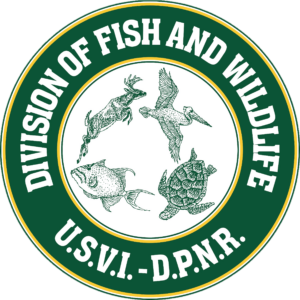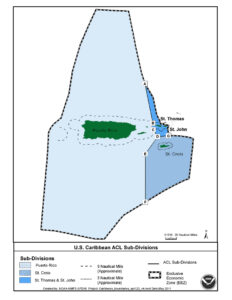 MENU
MENU
 MENU
MENU

All visitation to offshore cays managed by DPNR must be done by permit. Permits may be applied for on the DFW Permits page. Those cays are listed below. All other cays are either privately or federally managed and permission to visit those cays should be made appropriately.
DPNR managed cays: Bovoni, Capella, Carval, Cas, Cockroach, Congo, Cricket, Dog, Dutchcap, Flanagan, Flat, Little Flat, Frenchcap, Grass, Hassel, Kalkun, Leduck, Outer Brass, Perkins, Ruth, Saba, Sail, Salt, Savana, Shark, Turtledove, West, Whistling.
Remove hazards from around the sea turtle staying at least 6 feet away from the turtle at all times. Please call the Sea Turtle Assistance and Rescue Network’s 24/7 hotline (340) 690-0474 to report all sea turtle activities in the USVI. They can also be reached by message on Facebook.
Yes, all recreational fishers should register for their recreational angler license here.
No. It is illegal to remove shells, sand or coral (including rocks) from the shorelines of the USVI.
Please refer to V.I.C. Title 12, Chapter 2, subsection 105 that states “No person may take, catch, possess, injure, harass, kill, or attempt to take, catch, possess, injure, harass or kill, or sell or offer for sale, or transport or export, whether or not for sale, any indigenous species, including live rock; except that persons holding valid fishing or hunting licenses, scientific or aquarium collecting permits, or indigenous species retention permits, may operate within the scope and under the terms and conditions expressed in those licenses and permits.”
Yes, the USVI has several seasonal closures for various fish species. Please visit our Resources page for more information.
Yes, the Division of Fish and Wildlife issues permits for all research activities. Visit our permit application page for more information.
To import conch for fish from outside the USVI, please contact U.S. Customs and Border Protection (340-774-2510) for rules and regulations.
A CITES permit must be obtained from the U.S. Fish and Wildlife Service to import Queen Conch from outside the U.S. For information on importing wildlife, contact the port of entry nearest to you. Contact information for wildlife ports is available from the U.S. Fish and Wildlife Service Office of Law Enforcement at www.fws.gov/le/ or by calling 730-358-1949.
Fishing is allowed from any public shoreline, but be aware of accessing fishing grounds from private property. Please refer to the Shoreline Fishing Guides on our Resources page.
The following areas are restricted to fishing: Grammanik Bank, Hind Bank Marine Conservation District, Lang Bank Red Hind Spawning Aggregation Seasonal Closure, Mutton Snapper Spawning Aggregation Seasonal Closure, St. Thomas East End Reserves, St. Croix East End Marine Park, Virgin Islands National Park, Virgin Islands Coral Reef National Monument, Buck Island Reef National Monument.
Ciguatera fish poisoning is an illness caused by consuming fish that have eaten a marine toxin produced by algae. The toxin tends to accumulate in larger predatory fish species such as barracuda, some mackerels, jacks, snappers and groupers. However, it is still possible for any fish to cause ciguatera poisoning. USVI commercial fishers are knowledgeable about high-risk species and do not sell them. If you are concerned about a particular species, do not hesitate to ask a local commercial fisher or contact the Division of Fish and Wildlife. There is currently no way to determine if a fish has ciguatera prior to consuming it and cooking the fish does not destroy the toxin. Symptoms may include nausea, vomiting, numbness, muscle pain, and reversal of hot and cold sensations. Symptoms may begin 6 to 24 hours after consuming a contaminated fish and may last for days to weeks. If you think you have ciguatera poisoning, go to the hospital. More information on ciguatera poisoning can be found here.
DFW is 100% federally funded. The programs that fund the Bureau of Fisheries are:
The DPNR Division of Fish and Wildlife (DFW) preserves, protects, restores, and manages the fish and wildlife resources of the Virgin Islands for ecological conservation and sustainable use by the community. To accomplish this mission, under 12 V.I.C 2 § 101 DFW has authority to protect, conserve, and manage indigenous fish, wildlife and plants, and endangered or threated species for the ultimate benefit of all Virgin Islanders, now and in the future. This includes providing outreach and educational resources on and promotion of responsible and sustainable use of these fisheries, wildlife, and plant resource, and research, licensing, and the development of rules and regulations which inform the responsible management and protection of the fisheries, wildlife, and plant resources in the territory. This gives DFW jurisdiction of the wildlife, and plants within all terrestrial (land-based) areas of the US Virgin Islands, and all fish and wildlife between the shoreline and 3 nautical miles within the US Exclusive Economic Zone (EEZ) of the ocean surrounding the USVI, which encompasses the territorial waters of the USVI.

The Department of Planning and Natural Resources and the Aquaculture and Mariculture Commission of the Virgin Islands, created by Act 6471 are developing more comprehensive rules, regulations, and a strategic plan for aquaculture and mariculture in the territory.
At present there are a variety of requirements and permits from both territorial and federal agencies that need to be met or approved, depending on the type of aquaculture operation and facility that you would be interesting in developing. At minimum you would need to ensure that the location for any such aquaculture operation meets the zoning requirements, under which aquaculture operations are allowed, or secure a territorial or federal lease in land zoned for those purposes; These include A-1, A-2, R-5 (in some instances), I-1, I-2, or W-1, W-2. In addition, depending on the type of operation you would likely require:
The process for developing a fish farming operation does require multiple steps through several federal and territorial agencies, the DPNR – Division of Fish and Wildlife and the Aquaculture and mariculture commission have worked to develop more streamlined rules and regulations, compliance policies, and a 5-year plan to help stimulate the development of aquaculture and mariculture in the USVI. These are currently in review for promulgation and release by the executive branch of the Government of the Virgin Islands. If you are planning on developing an aquaculture or mariculture operation in the territory, please be sure to reach out to us so we can help guide you through the process.
Fishing with hook and and cast netting for baitfish are allowed only in specific areas within the St. Thomas East End Reserves (STEER), fishing with any other gear or outside of the allowed areas specific to cast nets or hook and line fishing is expressly prohibited. These special activity licenses are required in addition to a recreational or commercial fishing license. A monthly St. James hook and line fishing license allows the license holder to fish withing the St. James Reserve/Zone C only, within STEER. The cost of the license is $2.00/month.
Baitfishing using a cast net with a minimum square mesh size of ¼ inch is allowed within 50 ft from shore on the north and west shorelines of Cas Cay in the Cas Cay/Mangrove Lagoon Reserve/Zone B and in the St. James Reserve/Zone C, excluding Cow and Calf Rocks, within STEER. The cost of the license is $5.00/month.
The USVI recreational fishing license, the St. James Reserve hook and line fishing license, the STEER Baitfishing license will be available at the US Virgin Islands Recreational Licensing System at https://www.gooutdoorsusvi.com, upon its public release. Until that time recreational licenses can be registered for no cost at: https://www.usvifishinglicense.org/, and the special activities hook and line or baitfish licenses for STEER can be purchased from the Division of Environmental Enforcement at the DPNR Cashier on the 2nd floor of the VIYA Building M-F from 8am-5pm at 4611 Tutu Park Mall, Suite 300, 2nd Floor, St. Thomas, VI 00802.
St. Thomas
Located at Tropical Marine
6747A Estate Nadir #27
St. Thomas, VI 00802
Phone: 340-775-6762
St. Croix
45 Mars Hill
Frederiksted, VI 00841
Phone: 340-773-1082
Business Hours
Monday – Friday
8:00am- 5:00pm